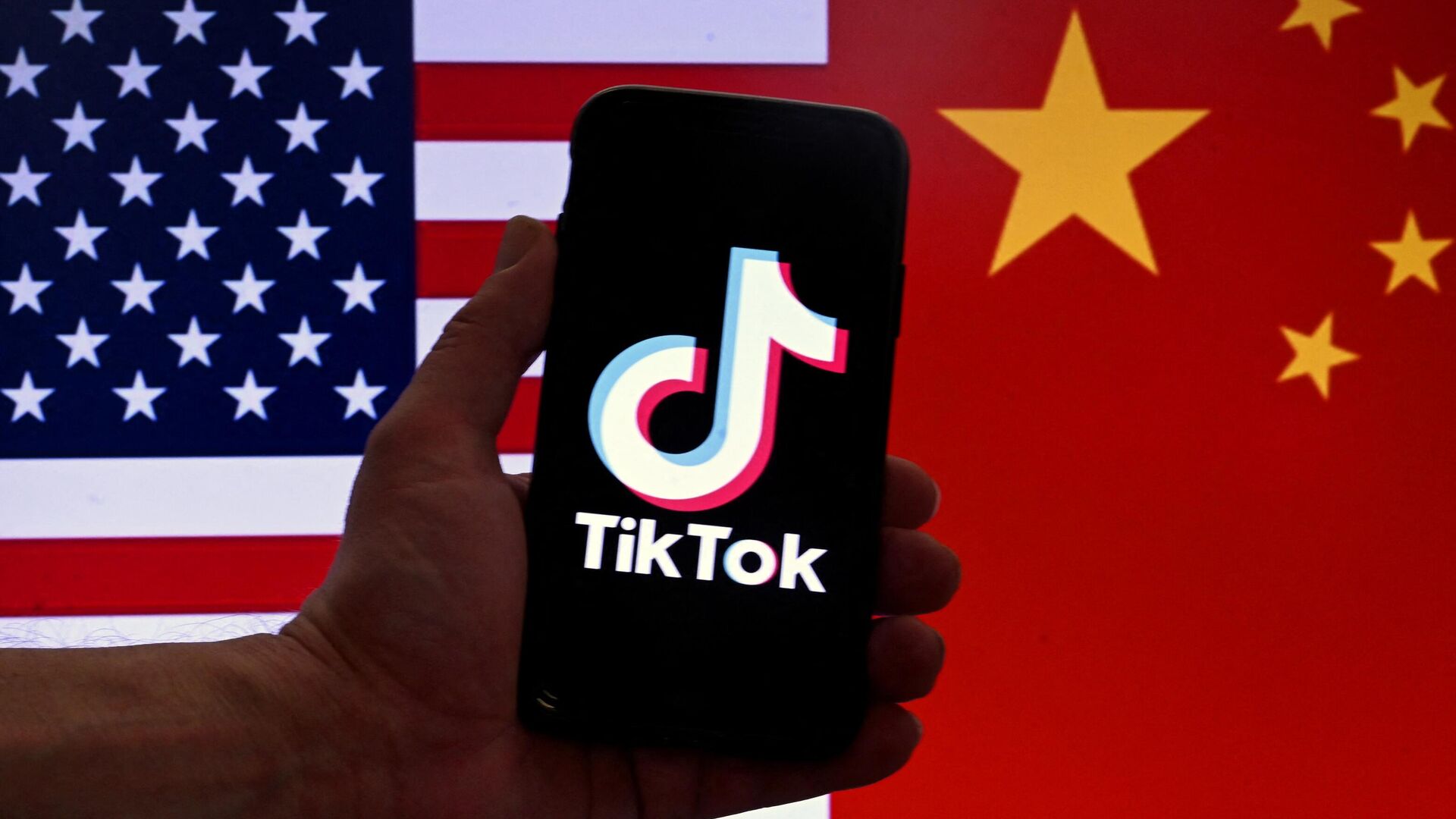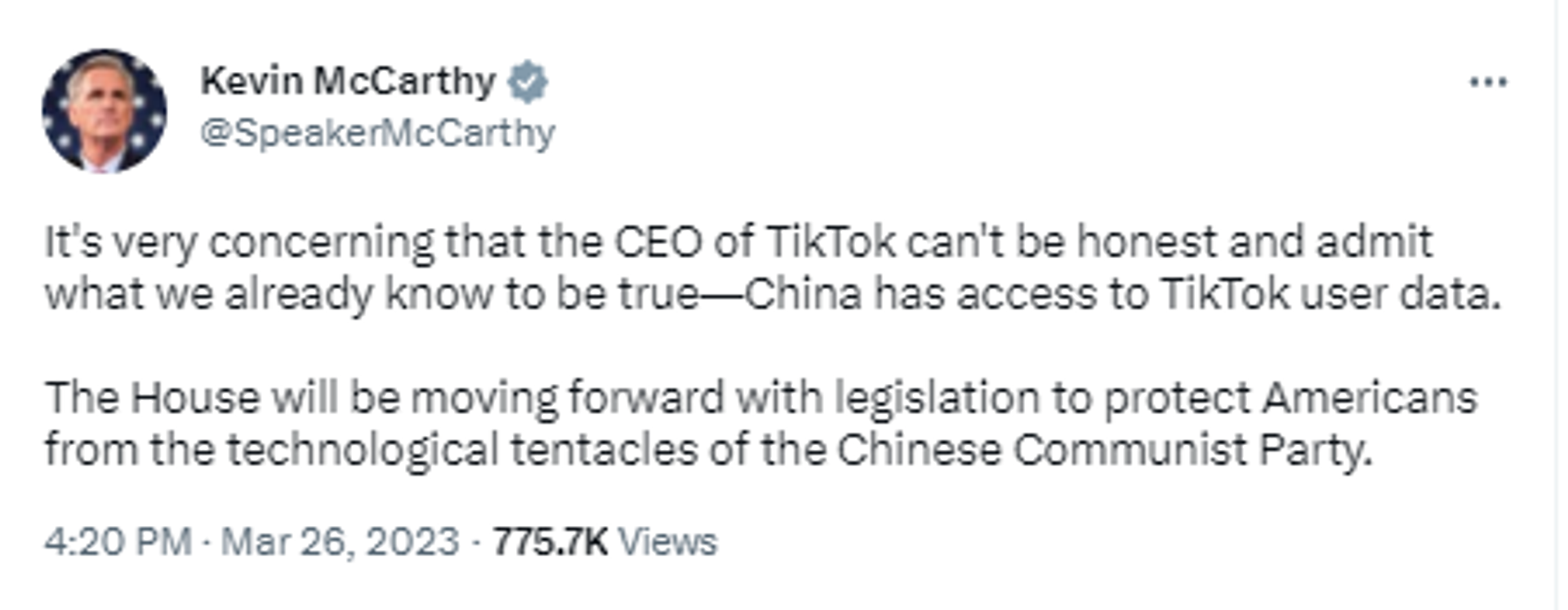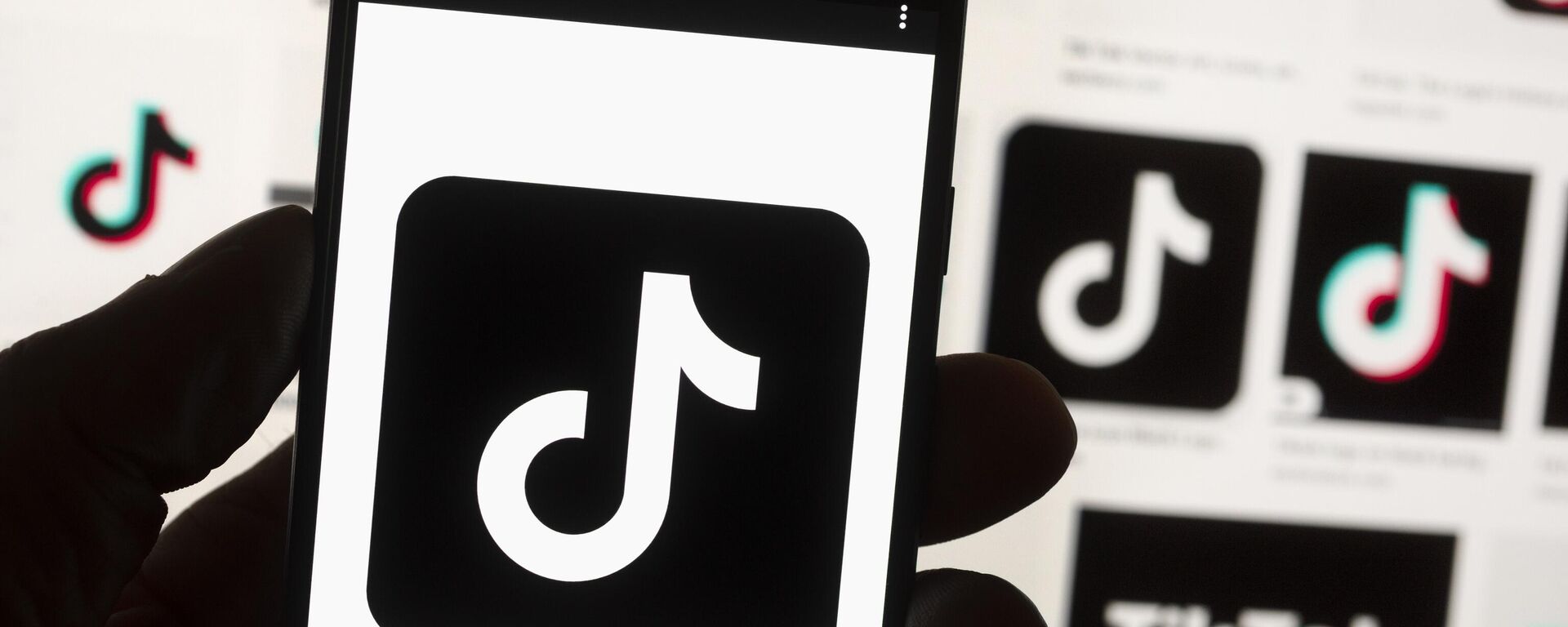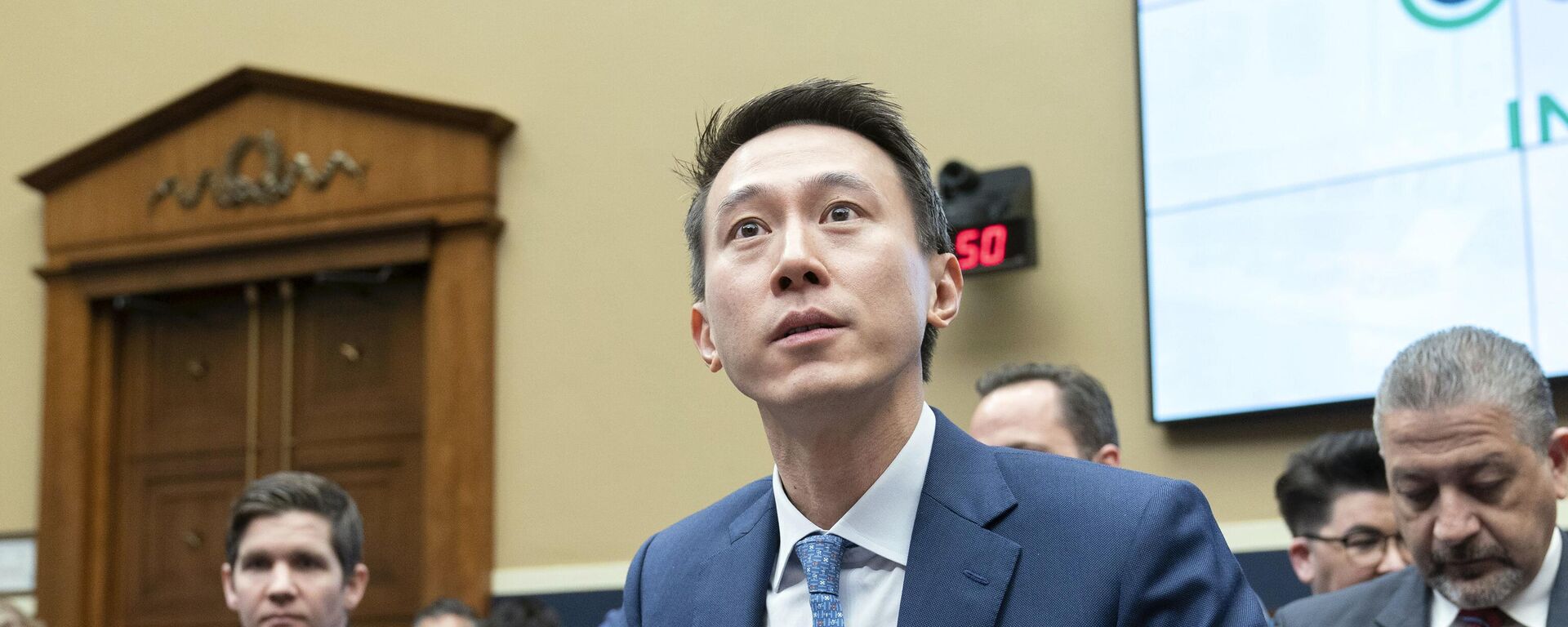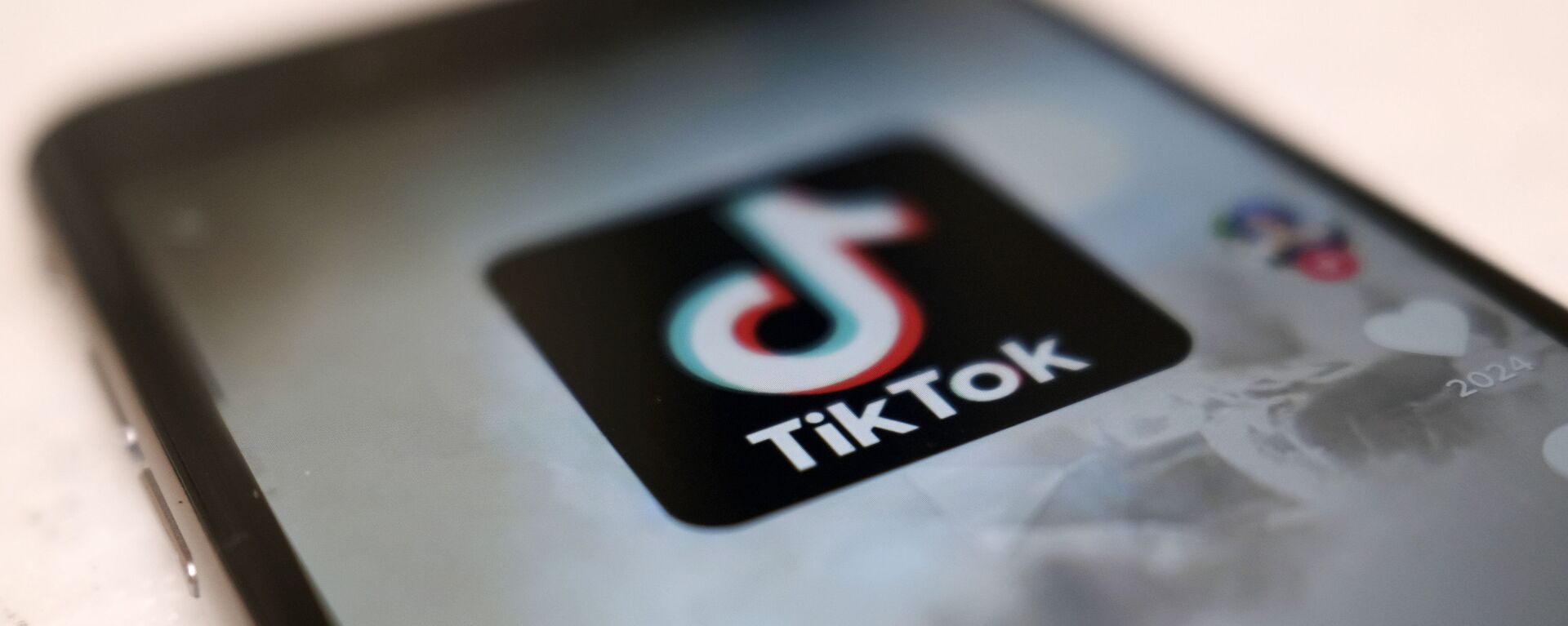https://sputnikglobe.com/20230327/lawmakers-to-move-ahead-with-tiktok-bill-to-protect-americans-from-chinas-technological-tentacles-1108815947.html
Congress to Move Ahead With TikTok Bill to Protect Americans From China's 'Technological Tentacles'
Congress to Move Ahead With TikTok Bill to Protect Americans From China's 'Technological Tentacles'
Sputnik International
US lawmakers will move ahead with TikTok legislation to protect American users from "the technological tentacles of the Chinese Communist Party", House Speaker says.
2023-03-27T07:05+0000
2023-03-27T07:05+0000
2023-03-27T07:54+0000
americas
us
tiktok
ban
kevin mccarthy
credit suisse group ag
bytedance
china
user data
joe biden
https://cdn1.img.sputnikglobe.com/img/07e7/03/17/1108724668_0:147:3121:1902_1920x0_80_0_0_c886840f2964f9cf3a070102e6e97231.jpg
American lawmakers intend to push ahead with a bill aimed at addressing national security concerns about Chinese video-sharing app TikTok, Speaker of the US House of Representatives Kevin McCarthy said on Sunday. Reiterating the allegations that user data was being accessed by the Chinese government, McCarthy waxed eloquent, tweeting that it was time to "protect Americans from the technological tentacles of the Chinese Communist Party." He also referenced the recent grilling that TikTok CEO Shou Zi Chew faced at a US House Committee, saying that he had failed to be "honest" in admitting "what we already know to be true."The US House Energy and Commerce Committee held a hearing on March 23 featuring testimony from TikTok CEO Shou Zi Chew. Lawmakers questioned him about the platform's data privacy practices and alleged ties to the Chinese government. Chew offered assurances that Chinese technology firm ByteDance Ltd., which owns the short-form video-sharing app, takes multiple efforts to safeguard US user data. He repeatedly rejected claims that the platform colluded with the Chinese government. However, obdurately skeptical US lawmakers reiterated their calls for a ban.The popular social media app launched in 2016 by the Beijing-headquartered technology company ByteDance allows users to create, watch, and share mainly 15-second videos on mobile devices. The platform, which reportedly boasts about 150 million monthly active users across America, has long been in the US government's crosshairs. The mere fact that TikTok is owned by a Chinese company placed a target on its back, with White House officials claiming that China’s law would require ByteDance to aid authorities in intelligence and national security matters if asked. Accordingly, TikTok’s alleged ability to give Beijing the data of the app’s users in the US has triggered national security concerns.The House Foreign Affairs Committee passed a bill in early March, allowing President Joe Biden to ban TikTok nationwide. The panel voted 24-16 along partisan lines in favor of H.R. 1153, which is intended "to provide a clarification of non-applicability for regulation and prohibition relating to sensitive personal data under International Emergency Economic Powers Act, and for other purposes."The measure now advances to the House of Representatives. A TikTok ban would require passage by the full House and the Senate before POTUS can sign the measure into law. Furthermore, on February 27, President Biden gave government agencies 30 days to ensure that the video-making app is not on any federal devices and systems. More than half of America's states have already taken steps toward a partial or full ban of TikTok on government devices.Back in 2020 the Trump administration unsuccessfully attempted to ban TikTok as well as the Chinese media platform WeChat, allegedly in order to protect Americans’ privacy. TikTok, which separated its US division from ByteDance in 2020 and handed over data security to the US-based Oracle in 2020, has repeatedly rejected allegations that it shares information with the Chinese government.
https://sputnikglobe.com/20230326/senator-says-white-house-very-much-in-favor-of-bill-to-ban-tiktok-1108807856.html
https://sputnikglobe.com/20230324/congress-hearings-over-tiktok-social-media-app-are-anti-china-witch-hunt-1108747626.html
https://sputnikglobe.com/20230301/china-blasts-tiktok-ban-says-push-shows-us-insecurities-over-young-peoples-favorite-app-1107887554.html
americas
china
Sputnik International
feedback@sputniknews.com
+74956456601
MIA „Rossiya Segodnya“
2023
News
en_EN
Sputnik International
feedback@sputniknews.com
+74956456601
MIA „Rossiya Segodnya“
Sputnik International
feedback@sputniknews.com
+74956456601
MIA „Rossiya Segodnya“
us lawmakers, tiktok legislation, to protect american users, technological tentacles,e chinese communist party, house speaker, kevin mccarthy, access to app’s user data, security concerns
us lawmakers, tiktok legislation, to protect american users, technological tentacles,e chinese communist party, house speaker, kevin mccarthy, access to app’s user data, security concerns
Congress to Move Ahead With TikTok Bill to Protect Americans From China's 'Technological Tentacles'
07:05 GMT 27.03.2023 (Updated: 07:54 GMT 27.03.2023) Earlier in March, the US House Foreign Affairs Committee approved draft legislation that would allow the government to ban TikTok or any other foreign app if it was deemed a threat to national security. Access to TikTok from government devices is already prohibited in more than half of the United States.
American lawmakers intend to push ahead with a bill aimed at addressing
national security concerns about Chinese video-sharing app TikTok, Speaker of the US House of Representatives Kevin McCarthy said on Sunday. Reiterating the allegations that user data was being accessed by the Chinese government, McCarthy waxed eloquent, tweeting that it was time to "protect Americans from the technological tentacles of the Chinese Communist Party." He also referenced the recent grilling that TikTok CEO Shou Zi Chew faced at a US House Committee, saying that he had failed to be "honest" in admitting "what we already know to be true."
The US House Energy and Commerce Committee held a hearing on March 23 featuring testimony from TikTok CEO Shou Zi Chew. Lawmakers questioned him about the platform's data privacy practices and
alleged ties to the Chinese government. Chew offered assurances that Chinese technology firm ByteDance Ltd., which owns the short-form video-sharing app, takes multiple efforts to safeguard US user data. He repeatedly rejected claims that the platform colluded with the Chinese government. However, obdurately skeptical US lawmakers reiterated their calls for a ban.
The popular social media app launched in 2016 by the Beijing-headquartered
technology company ByteDance allows users to create, watch, and share mainly 15-second videos on mobile devices. The platform, which reportedly boasts about 150 million monthly active users across America, has long been in the US government's crosshairs. The mere fact that TikTok is owned by a Chinese company placed a target on its back, with White House officials claiming that China’s law would require ByteDance to aid authorities in intelligence and national security matters if asked. Accordingly, TikTok’s alleged ability to give Beijing the data of the app’s users in the US has triggered national security concerns.
The House Foreign Affairs Committee passed a bill in early March, allowing
President Joe Biden to ban TikTok nationwide. The panel voted 24-16 along partisan lines in favor of H.R. 1153, which is intended "
to provide a clarification of non-applicability for regulation and prohibition relating to sensitive personal data under International Emergency Economic Powers Act, and for other purposes."The measure now advances to the House of Representatives. A TikTok ban would require passage by the full House and the Senate before POTUS can sign the measure into law.
Furthermore, on February 27, President Biden gave government agencies 30 days to ensure that the video-making app is not on any federal devices and systems. More than half of America's states have already taken steps toward a partial or full ban of TikTok on government devices.
Back in 2020
the Trump administration unsuccessfully attempted to ban TikTok as well as the Chinese media platform WeChat, allegedly in order to protect Americans’ privacy.
TikTok, which separated its US division from ByteDance in 2020 and handed over data security to the US-based Oracle in 2020, has repeatedly rejected allegations that it shares information with the Chinese government.
